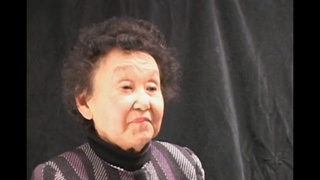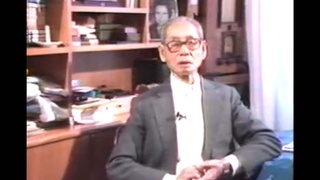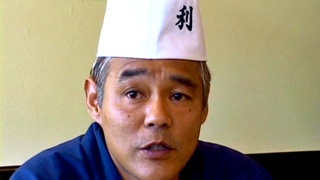Interviews
Life after internment in Slocan
I*: Now after, after the Slocan, where did you go? After Slocan where did you go?
After Slocan, Toronto. [Interruption] No, we were all right, because -- [interruption] -- because we were no menace, and... no, it's the people that they thought they were, you know... bad if we would do anything for the, against the community, then you were screened. But look at the young kid and a old man. What can they do? So we were okay.
I: Did you, were you sponsored? How did you... did you have a place to come to when you came to Toronto?
Yes.
I: And who sponsored you?
My uncle -- not my uncle, my nephew, George Sato.
I: Oh, George sponsored your family here?
Yeah.
I: So George was here before?
Yes, he was here before. He was working here. [Interruption]
I: How did you, how did you feel about coming out east?
Huh?
I: How did you feel about coming out east?
Coming, I didn't want to come out.
I: You didn't want to come?
Oh, no. It was forced.
I: Would you have rather stayed in B.C.?
Yes, at that time.
I: At that time.
But now, [shakes head].
I: Why did you think you wanted to stay in B.C.?
B.C.?
I: Yeah.
'Cause we knew everybody and we weren't scared of anybody. Here, we didn't know where we were gonna go, who we're gonna meet, what kind of work we were gonna get, you know what I mean? Oh, yeah.
I: So when you came to Toronto, what did you do?
Sewing.
I: Sewing?
Fifty cents an hour. No, fifty cents an hour. [Interruption] Osushi for forty years. Bazaar, forty years' bazaar. Gosh, forty years' bazaar. I'm, I... not because I'm sick, but last year I knew, I'm really getting little bit too old, and I told Sumi Takashima, Sumi, I don't think I could carry on next year. You do it. I got everything written from forty years ago. Forty years ago, what day the bazaar started, what time it started, what time we started with, how many boxes, and how many boxes we made the night before. You know? I've got everything written down in a little book.
*I indicates an interviewer (Peter Wakayama).
Date: December 2004
Location: Canada
Interviewer: Peter Wakayama
Contributed by: Sedai, the Japanese Canadian Legacy Project, Japanese Canadian Cultural Center
Explore More Videos

Devastation in Tokyo after World War II
(b. 1924) Political scientist, educator, and administrator from Hawai`i

Family life in a Japanese Canadian internment camp in Slocan
(b. 1920) Incarcerated during World War II. Active member of the Japanese Canadian community

Chose to go back to Japan
(b.1924) Japanese Canadian Nisei. Interpreter for British Army in Japan after WWII. Active in Japanese Canadian community

Getting a job at the British Army camp in Hiroshima
(b.1924) Japanese Canadian Nisei. Interpreter for British Army in Japan after WWII. Active in Japanese Canadian community

Choice to move east or go to Japan
(b.1920) Japanese Canadian Nisei. Established the Ikenobo Ikebana Society of Toronto


Stereotypes about Japanese: past and present (Spanish)
(b. 1937) Professional journalist


Makegumi - Movement to regognize the defeat of Japan (Japanese)
A central figure for the “Makegumi” (defeatists)



